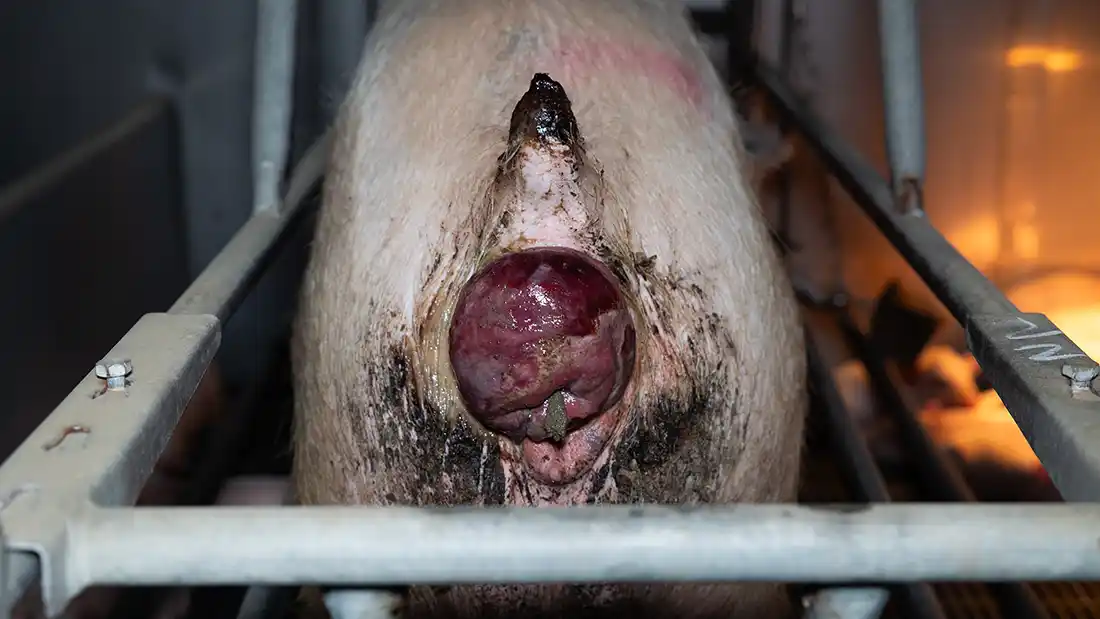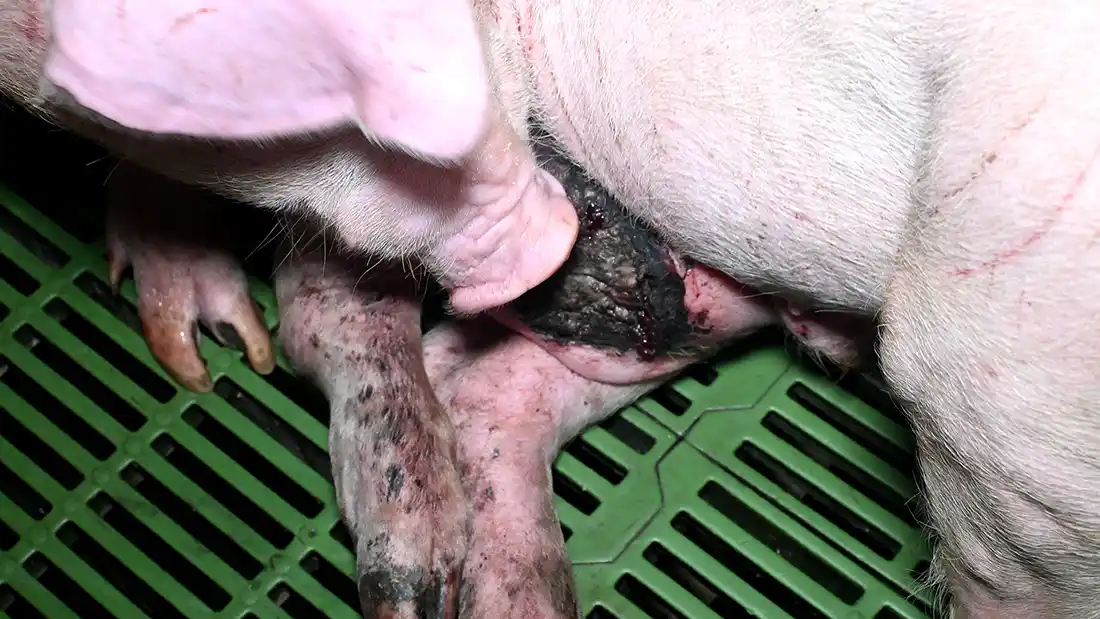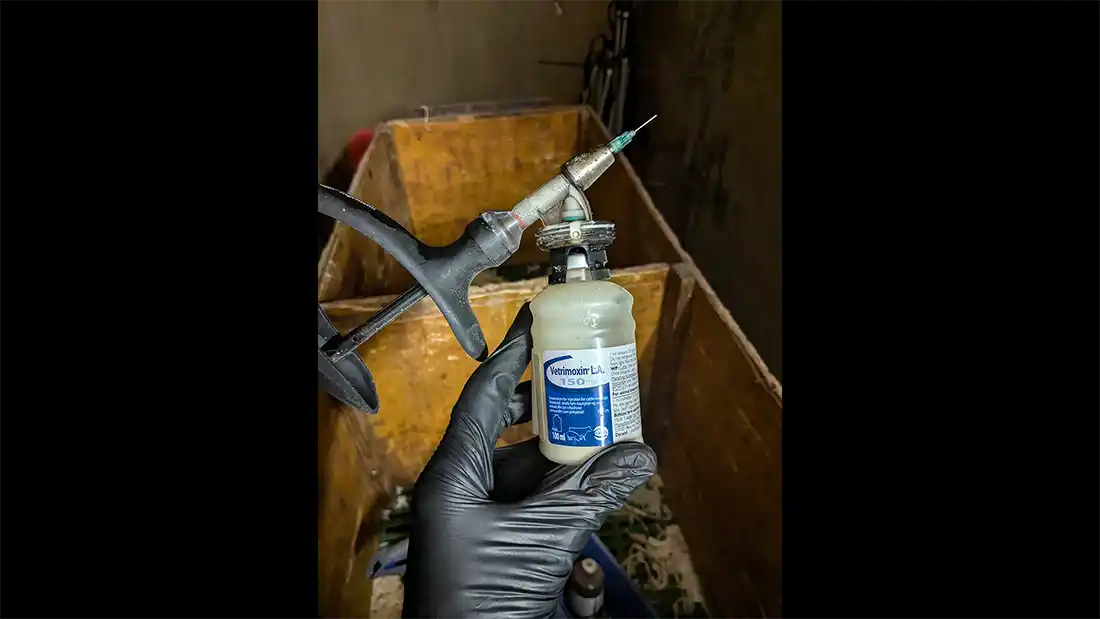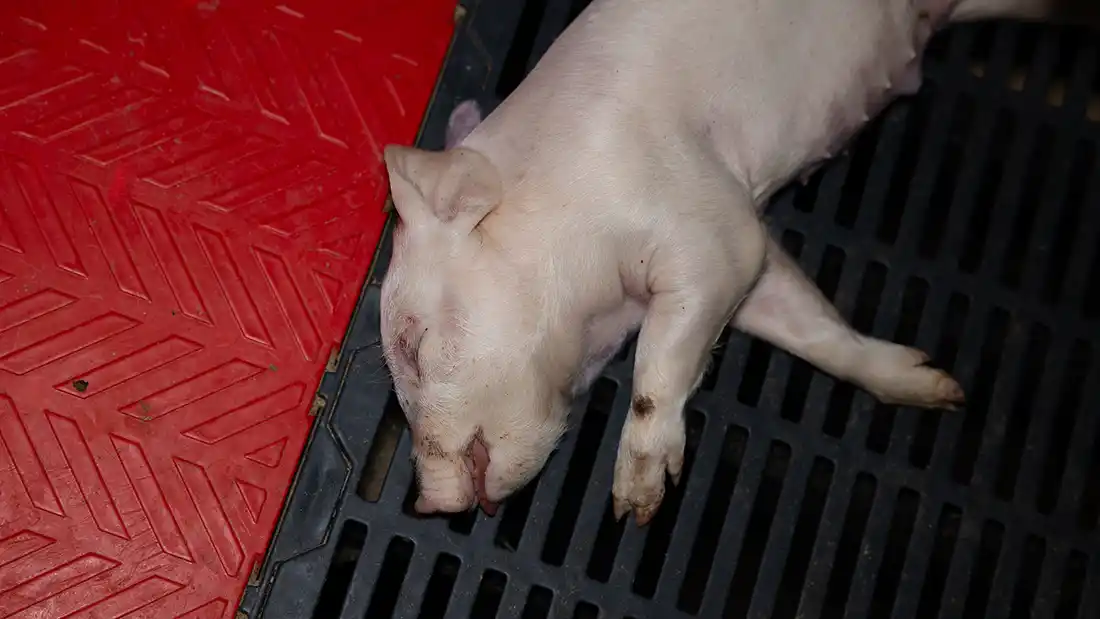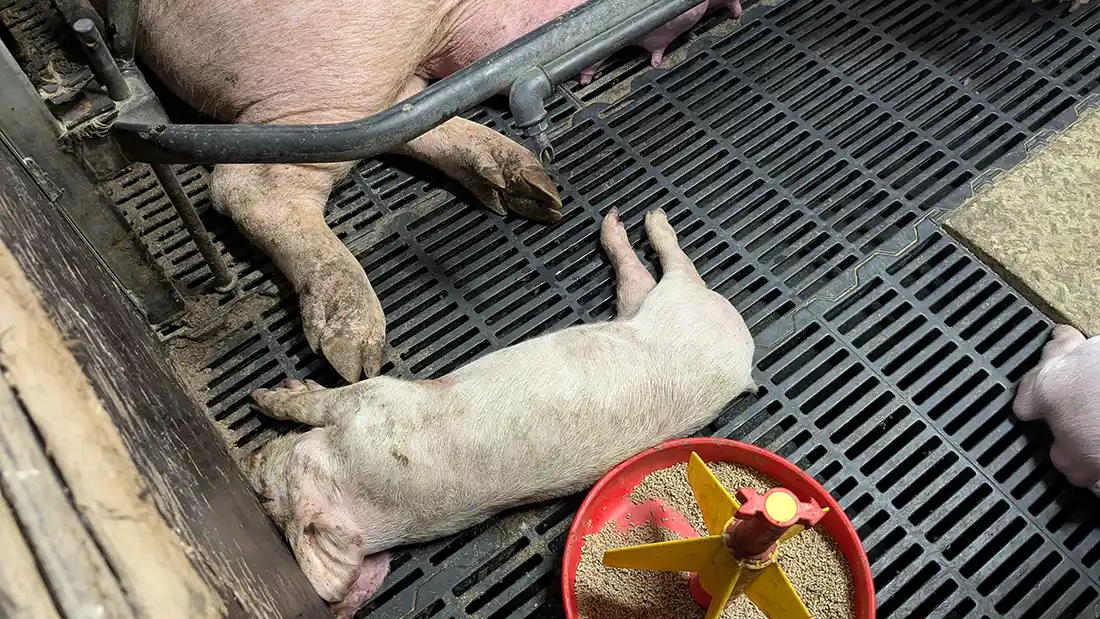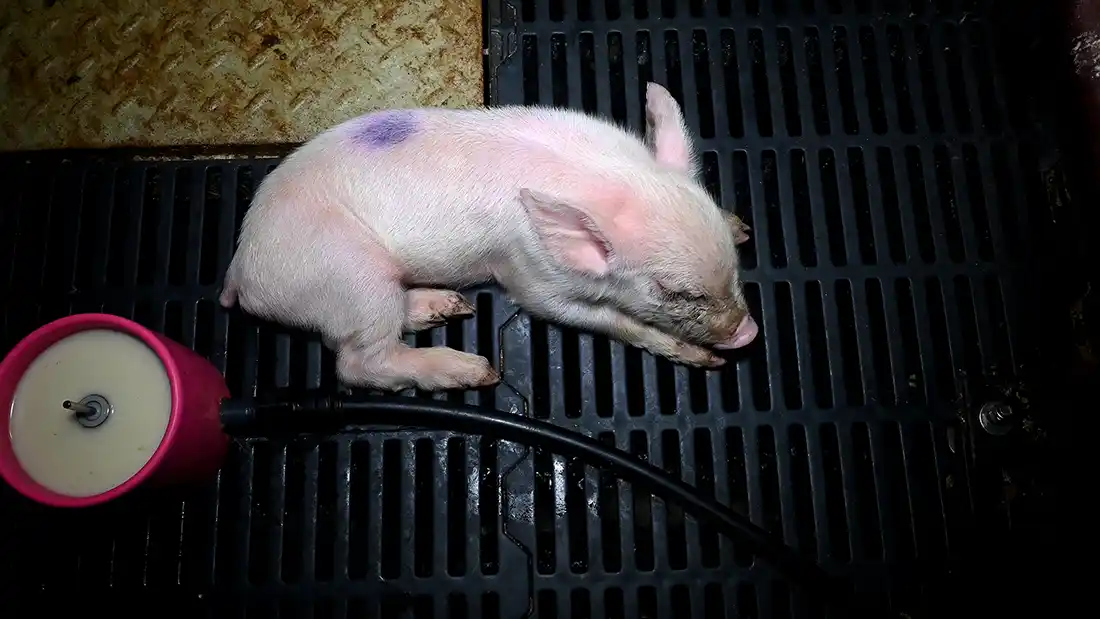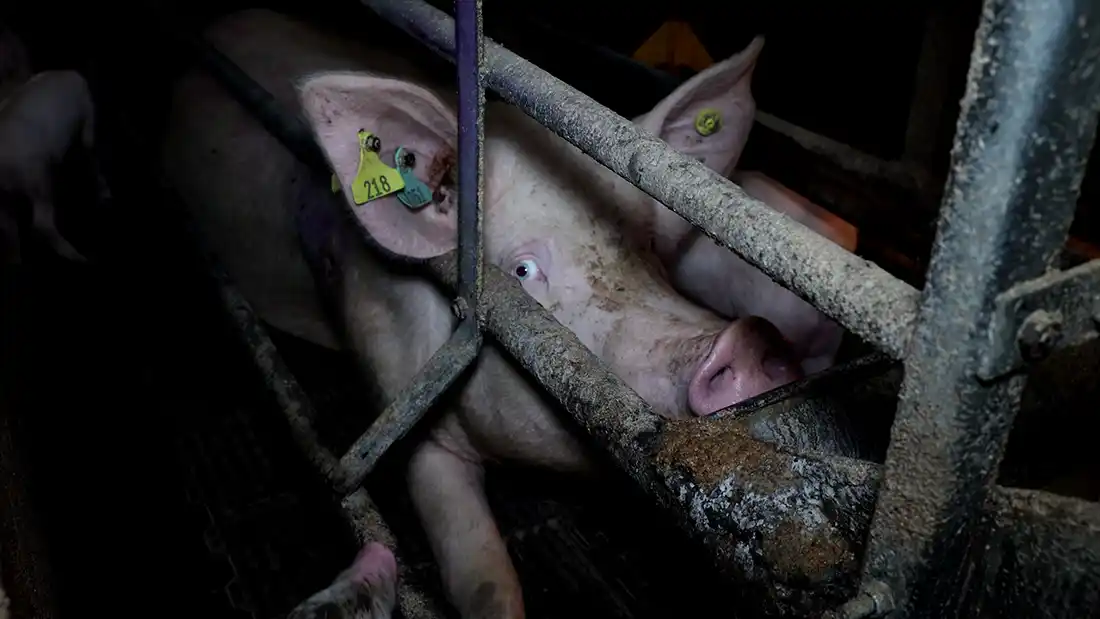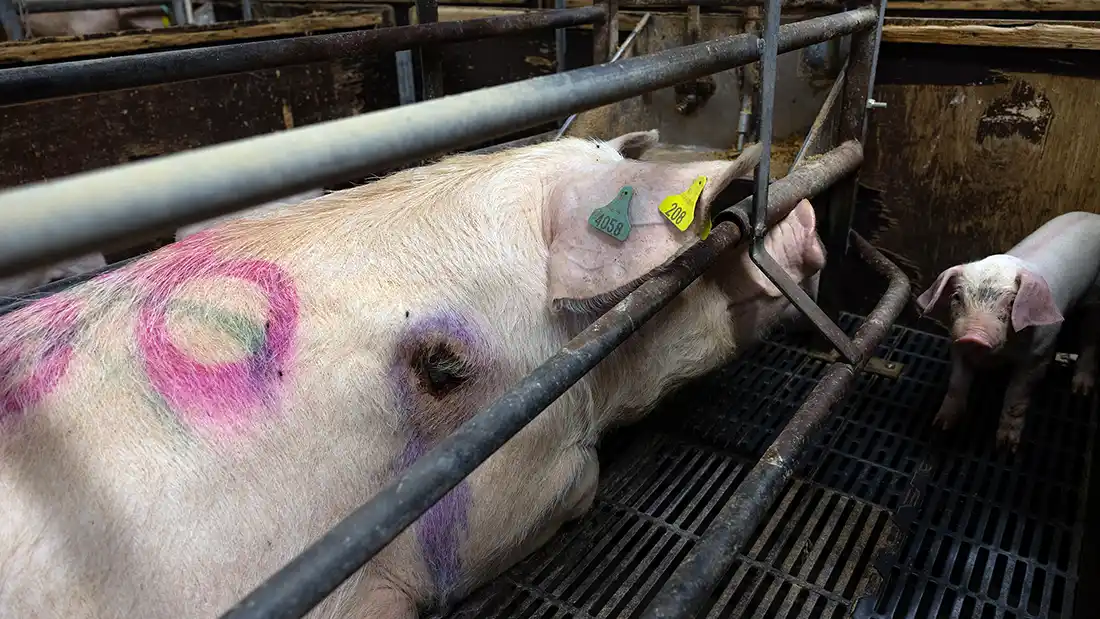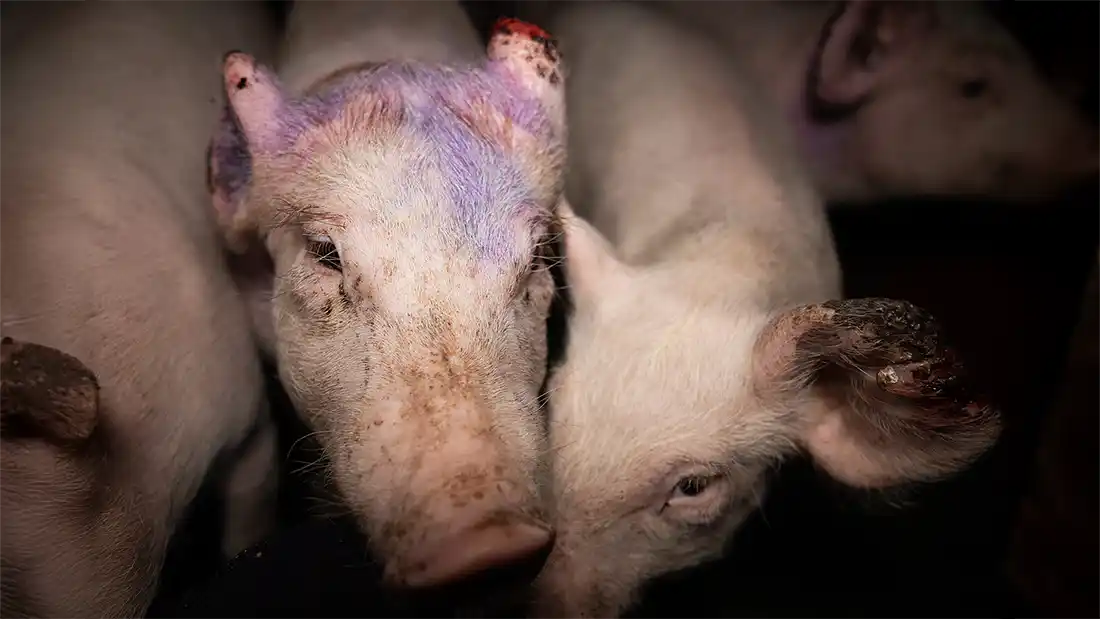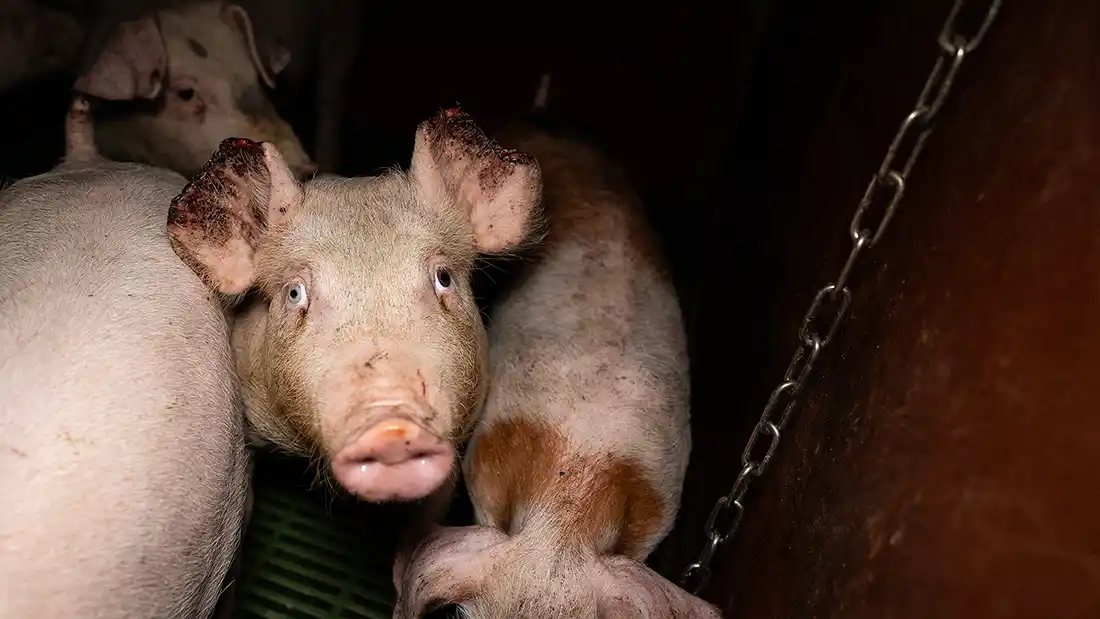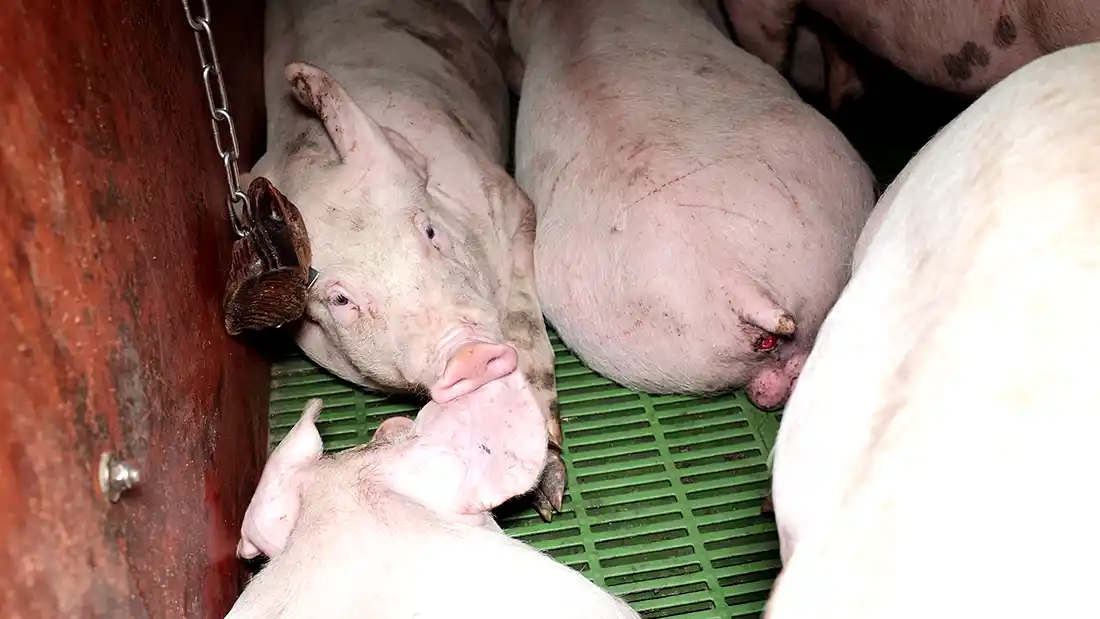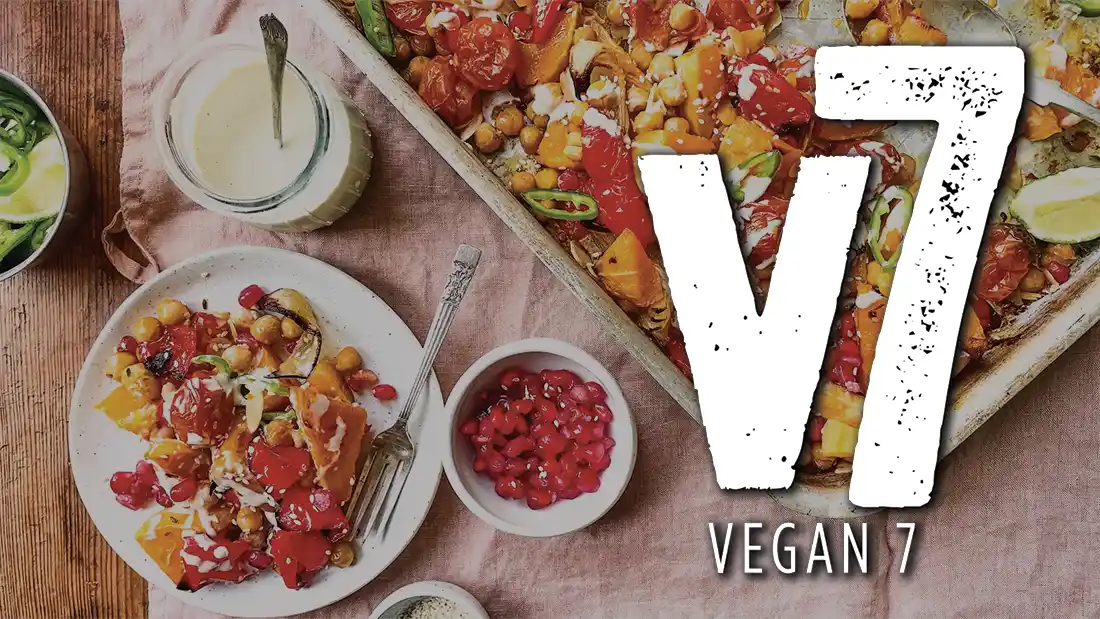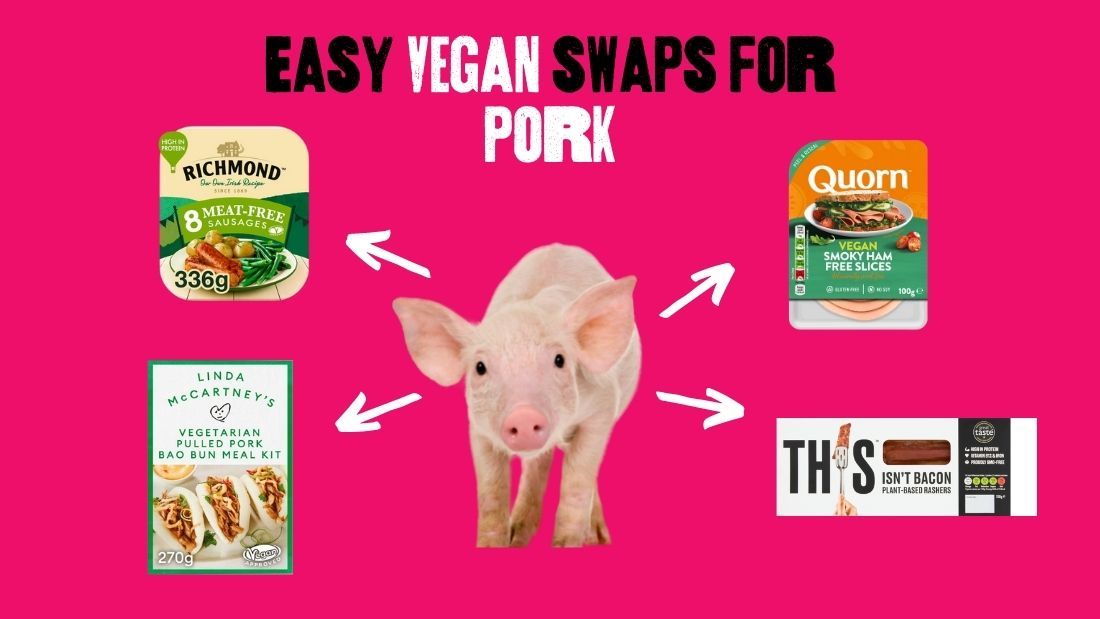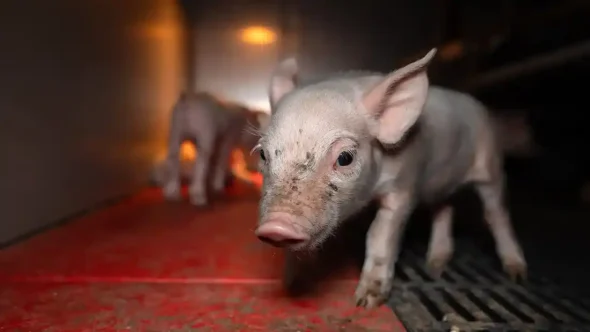Investigation: Britain’s Biggest Pork Producer
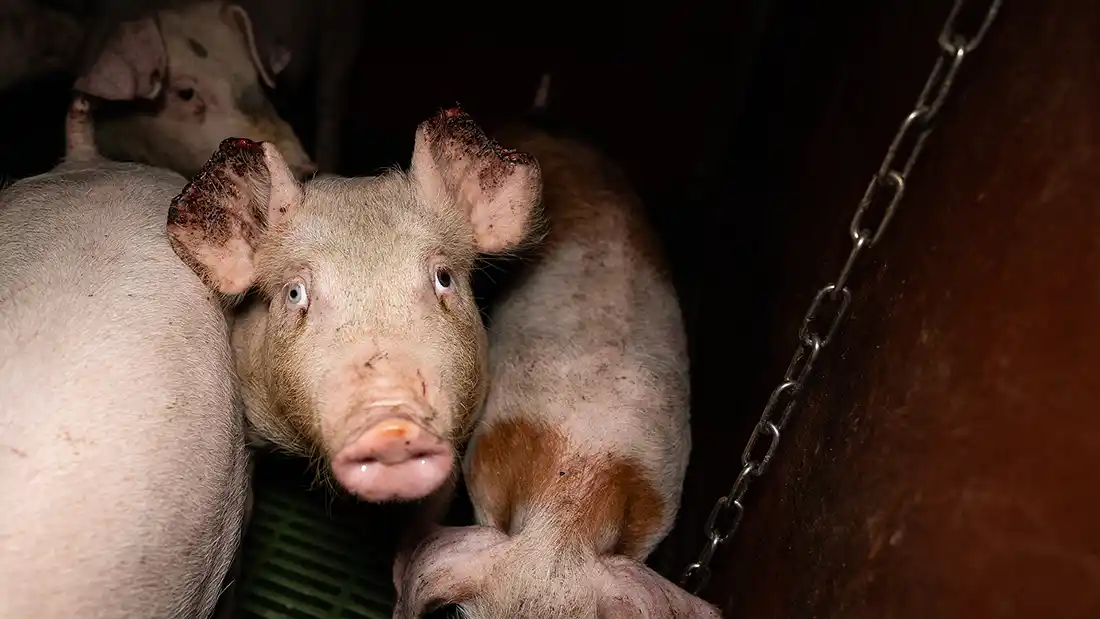
Scandalous scenes of animal abuse have been recorded at two Red Tractor Assured farms operated by Cranswick Plc in Lincolnshire – Manor Farm and Southwold Farm. Cranswick, hailed as an ‘industry leader’, is Britain’s biggest pork producer and supplies major UK supermarkets – including Asda, Morrisons, Sainsbury’s and Tesco. Inside these intensive facilities, investigators found severe vice injuries due to boredom, ear necrosis, umbilical hernias and rectal prolapses.
Sadly, the general conditions found at both Manor and Southwold farms are typical of intensive factory farms, where animals are treated as nothing more than commodities. This is the grim reality for most pigs, cows, sheep and chickens farmed for food across the UK: 85 per cent of farmed land animals are kept captive in factory farms and 98 per cent of pigs spend most of their lives trapped indoors.
Cranswick is proud of their ‘Great British Taste’. But the truth is that British pig farming is a national disgrace.
The investigation revealed painful injuries and ill health amongst the pigs. Several animals had congenital defects such as umbilical hernias, which are common in pig farming. One pig was found with a protrusion that had burst. Treatment often requires surgical repair performed by a veterinarian under local anaesthesia and so is largely denied to those confined on factory farms.
Investigators also found a sow trapped in a farrowing crate suffering from a large uterine prolapse. These occur when the uterus is turned inside out and protrudes from the sow’s body – likely from the toll of birthing extensive litters. These prolapses are often impossible to treat without internal haemorrhaging.
A wide variety of antibiotic medications were found on-site, mostly for the treatment of respiratory infections. The barren, stressful and crowded conditions of factory farms make pigs more susceptible to disease. Treating infections is cheaper than reforming the conditions in which they arise.
Naturally, sows would produce between four to seven piglets in a litter but due to selective breeding, litters are upwards of 14 piglets on UK farms. With more piglets competing for space in the womb and access to the sow for feeding, alongside a higher incidence of disease on factory farms, many piglets will be stillborn or die before weaning.
The pre-wean mortality rate of piglets in the UK is 16 to 20 per cent, meaning it is typical for two piglets to die per litter. At Manor Farm, documents indicated that from one huge litter of 17 piglets, only 12 survived.
Farrowing is the name given to the process of giving birth in pig farming. The cycle of continual farrowing for a sow begins when she is just six to eight months old, her role is to produce the maximum number of piglets. Around 60 per cent of British sows are trapped in farrowing crates from a few days before giving birth until their piglets are weaned – typically between three to five weeks. They cannot turn around, build a nest or interact with their piglets as they would naturally; they are mothers imprisoned.
The pig industry says that the reason for using farrowing crates is to protect piglet welfare and stock person safety. However, this is disingenuous as piglet mortality is similar in outdoors units where farrowing crates are not used.
Several sows at Manor Farm had visible crate sores – infected ulcerated skin around their shoulders – as a result of continuously rubbing against the metal bars of their crates. Despite shoulder sores and a uterine prolapse, injured sows remained imprisoned. According to Red Tractor standards, sick or injured pigs must get prompt attention so suffering isn’t prolonged; where appropriate, they must be isolated in suitable accommodation with dry bedding and may need humane killing. This applies to severe conditions such as prolapse.
Factory farming conditions make it impossible for pigs to fulfil their natural intelligent, curious and sociable nature.
According to Red Tractor pigs must have permanent access to environmental enrichment materials that allow them to investigate and manipulate (root, chew, play). Chains or hard toys alone are not enough — they must be combined with manipulable materials. Enrichment has to be “readily available and accessible” to every pig to reduce tail biting, stress or aggression.
At both farms, investigators found widespread vice injuries from abnormal behaviours such as tail, ear and flank biting. So severe were some of these injuries in piglets at Manor Farm that their ears had turned necrotic – where the tissue dies as a result of persistent ear biting. The only enrichment activity visible was a chain with a wooden block, which is widely recognised as insufficient enrichment to prevent injurious behaviour. Pigs were biting each other’s ears, and many more were covered in scratches.
Exposés of Cranswick farms reveal that these industrial facilities are not where ‘great food comes from’, but rather where animals are confined in barren pens and left to suffer. This cannot be a source of national pride! Around 85 per cent of the UK’s farmed land animals are imprisoned in factory farms, this is the British way. The barbaric conditions we have found are the rule – not an exception to it.
Shockingly, most of what we’ve revealed is standard practice and assured by the UK’s biggest food assurance scheme – Red Tractor. As a nation of animal-lovers we’re led to believe we have some of the highest animal welfare standards in the world. This is highly questionable. In rubber-stamping such cruelty, Red Tractor causes itself serious reputational damage and risks destroying its own credibility.
The common cause behind widespread injury, disease and death amongst most farmed animals is factory farming.
Factory farms only exist because there’s a huge demand for cheap meat, fish, dairy and eggs. When fewer people buy animal products, more animals are spared this tortuous existence. So-called assurances like Red Tractor and even the RSPCA keep failing; we also cannot rely on our government to change things. Going vegan is the only way to ensure that the food on your plate has not endured a life like this.
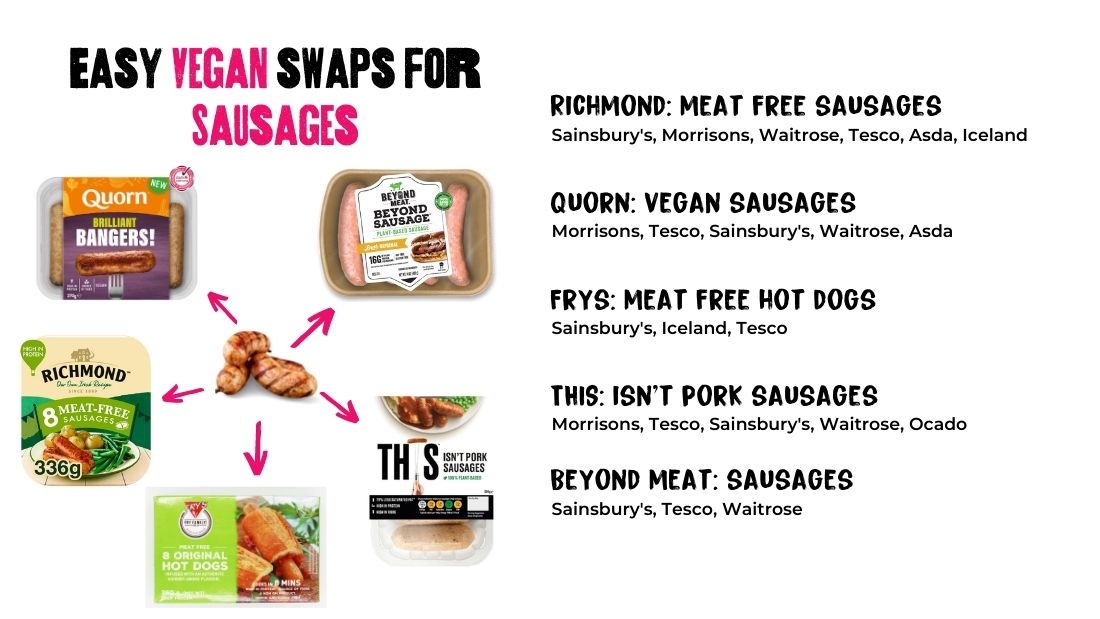
- Cranswick: https://cranswick.plc.uk/investors/reports-accounts
- Cranswick in East Anglia: https://www.theguardian.com/environment/2025/feb/05/east-anglian-farms-breach-environment-regulations-700-times-in-seven-years
- 85% of farmed land animals live in factory farms: https://www.ciwf.org.uk/our-campaigns/factory-farming-map/
- 98% of pigs spend most of their lives trapped indoors: https://www.cpre.org.uk/wp-content/uploads/2019/11/The_future_of_pig_and_poultry_farming.pdf
- Antimicrobial resistance: https://www.who.int/news-room/fact-sheets/detail/antimicrobial-resistance
- Wild pig litter size: https://wildlife.onlinelibrary.wiley.com/doi/10.1002/jwmg.22304
- Commercial sows litter size: https://ahdb.org.uk/knowledge-library/2021-pig-cost-of-production-in-selected-countries
- Piglet mortality: https://swinehealth.ceva.com/blog/how-to-reduce-piglet-mortality-in-the-farrowing-unit
- 60% of British sows are trapped in farrowing crates: https://www.rspcaassured.org.uk/farmed-animal-welfare/pigs/
- Red Tractor standards: https://redtractorassurance.org.uk/standard-categories/pigs/
- The UK’s code of practice for pig farming: https://www.gov.uk/government/publications/pigs-on-farm-welfare
- Ear necrosis: https://www.nadis.org.uk/disease-a-z/pigs/ear-tip-necrosis/
- Red Tractor denials: https://viva.org.uk/red-tractor-overview/
RSPCA failure: https://www.bbc.co.uk/news/articles/cyv381edvg9o




